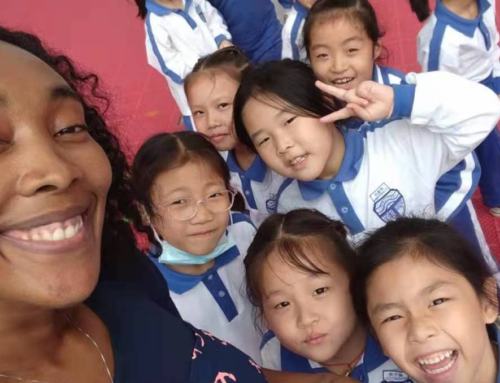Chinese teenagers…why are they amazing students?
Unless you come to China to work at a Kindergarten or a Primary School chances are you will be teaching all age groups and that includes: teenagers! Most prospective teachers, during the interview, when asked which age group they like, the most common answer usually goes something along the lines of: the little ones are very cute, the elementary school level kids need a lot of attention but I like teens and adults because I can communicate with them. But of course, this is not true for everyone; some are terrified of teaching teens, especially when it comes to behavior and attitude. So, let’s take an in-depth look at Chinese teenagers and discover how to make the experience of teaching teenagers an amazing one every time. In order to do this, we will start by meeting a Chinese teenager who is currently an ESL student at EF Shijiazhuang and then looking at some challenges faced by teachers when teaching teens and how to overcome them.
A day in the life of a Chinese teenager
Meet John, he is 13 and he lives in Shijiazhuang, Hebei Province, in China. John has a very busy life, Monday through Friday he attends his middle school, a very early start around 7:00 in the morning and after a full day of lessons there comes a few extra hours of homework after a short bike ride home and he’ll make it to bed shortly past midnight. If he doesn’t have homework, he’ll still make it to bed way past midnight as he would use the free time to enjoy his favorite computer games or chat with his friends on WeChat or QQ. When does he have time to have fun? During the weekend, right? Wrong! During the weekend John will attend on average three extra-curricular classes ranging from music (he plays the guitar) to math to the most important subject of them all (and his favorite): English! Whatever little time he has left he will go play basketball with his friends at the local sports center or dedicate more hours to sharpen his skills as an avid computer game player.
Don’t feel bad for John, he actually has a full and very busy life, and he is quite fortunate to be able to have access to the education he’s receiving. Still feel bad? Then, think about this. If you come to China, you’ll have plenty of students like John, for a couple of hours a week he will be your pupil, make sure he is having fun and enjoying the process of learning English. Furthermore, build a rapport with your students, get to know them and personalize your lessons to their likes, for example, you might love Nirvana, but your students will appreciate it more if you played some Michael Jackson or Linkin Park who are by far more popular and better know by Chinese teens, Nirvana is something their parents listened to. Many teachers sometimes wonder if they make a difference in their students’ lives. Small details like playing music they like, creating engaging lessons make a huge difference.
Teaching teens is always rewarding
 You’ve met John, the time he spends in your classroom will be a time he’ll use to learn, improve on all his skills, to talk to his classmates and to his teacher. Since teenagers have an attention span of over 50 minutes from the age of 11, they learn a lot faster and retain a lot more, thus, they are eager to practice what they have learned.
You’ve met John, the time he spends in your classroom will be a time he’ll use to learn, improve on all his skills, to talk to his classmates and to his teacher. Since teenagers have an attention span of over 50 minutes from the age of 11, they learn a lot faster and retain a lot more, thus, they are eager to practice what they have learned.
During class, after class, every second he is in school, John will jump at the opportunity to communicate with his teacher and this is something that ESL teachers really appreciate. Being able to communicate more naturally, without having to grade language so much, but is this is only reason teenage students are so great? It is actually the challenges they pose that makes them so great.
In fact, teaching teenagers can pose many challenges, for instance:
– Discipline problems – if the topic is boring they’ll tune out
– Attitude – having a bad day? Problems with friends? Teens don’t leave their problems at the door
– Motivation – If they don’t have a genuine reason to learn, they will never genuinely learn
While these problems are always present, they are manageable. There are always ways to keep teenagers engaged, it’s all a matter of getting to know them, find out what their interests are and incorporate that into the lessons. By doing this, the teen will find the topic interesting and he will feel motivated enough to leave any problems at the door and participate in class. Of course, this is not fool-proof, but it helps a great deal, students will respond well and your lessons will be a success.
The pursuit of motivation
Chinese teenagers have very busy lives, they have tonnes of homework to do and their love for computer games is almost an obsession. But, they are great students who are eager to learn and participate. This doesn’t happen automatically, the teacher brings the magic by getting to know the students and incorporating their thoughts and ideas into the lesson so they will feel interested and motivated.
If you’d like to teach amazing teens and all other age groups, click here and apply for positions available at EF Shijiazhuang, they are interviewing now!

















Hi,
Great article! I have recently started teaching in china and wanted to ask if you had any lessons plans. I am aware that making the lessons fun and engaging is important and western films and music is a good way to do this. I am finding it slightly difficult to structure a lesson around these topics. For example would watching a scene of harry potter then asking the re-enact the scene be useful.
thanks
Hi Adam, thanks for your kind words about the article, really appreciate it. As for a lesson plan, I have a suggestion based on a music lesson I’ve taught a couple of times with good results. I pre-taught different music genres to introduce vocabulary, then I played a few songs to illustrate the different genres (only 6 genres and only short 30 second samples). Following the introduction of vocal, I provided students with a couple of phrases they could use to talk about music (adjectives like “interesting” “loud”, etc) and then they would conduct a small survey asking five other students what their favorite genre was (this would encourage them to communicate more and put into practice what they are learning. Then, I explained and gave them a handout that I pre-made with the lyrics to “Sk8er Boi” by Avril Lavigne (I chose this song given her popularity in China, remember to choose materials they will like) the lyrics are split in stances and place on a table with two extra columns with the heading “boy” and “girl” the students have to read through the lyrics and write a sentence about what’s being said in regards to the boy and in regards to the girl. First we read the lyrics, then they go over them and circle the words they don’t know, we look up the words in the dictionary and then we listen to the song, then, they fill in the table while working in groups. Finally, we read the lyrics together again, and then try to have a sing-a-long to wrap up the lesson. For more advanced students you can have a mini-debate about teenagers and peer-preassure, or something, just don’t choose something controversial like teen-motherhood (which is mentioned in the song). To conclude, when using movies or songs, remember that the best way is to first present, introduce the vocabulary, the ideas, give some structures they can use, then provide them with an opportunity to practice the language and the structures finally have them produce the language so they can relate to the song and understand the purpose of learning it in class. All the best of luck!
The article is great. Not very helpful for me though. I’ve been looking for a way to connect with my high school students. I have 12 of them for one hour a week and I dread it every week. If i ask them what hey like, they just say sleeping and eating. We’ve learned lots of new words over the course of the year, but it always circles back to sleeping and eating. Besides making a lesson on food, I have no idea how to get them interested and no idea how to get them to open their mouths. I tried a scavenger hunt, power point lessons with pictures, and short videos. I can honestly say I hope I never have to teach teenagers again. I love teaching primary school. It’s not for everyone, but it’s definitely for me.